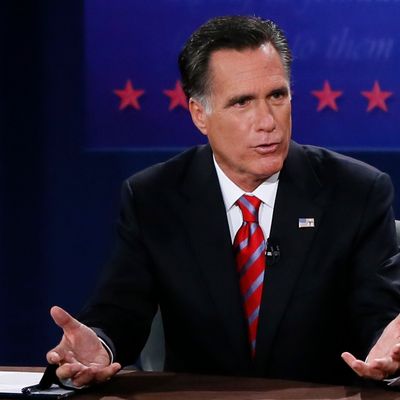
Every week, New York Magazine writer-at-large Frank Rich talks with assistant editor Eric Benson about the biggest stories in politics and culture. This week: Romney’s hollow foreign policy, Obama’s prickly memes, and why cars will be the story of the next two weeks.
The consensus, well summed up by the Atlantic’s Jeffrey Goldberg, was “Obama had a better debate, but Romney passed the commander-in-chief credibility test.” Do you agree?
That was the consensus, but it’s meaningless on several levels. This “Romney passed the commander-in-chief credibility test” is a Beltway cliché that means in this case that Romney didn’t duplicate the Gerald Ford, Sarah Palin calamity of garbling major facts (except those about his own previously stated positions) and that he regurgitated memorized boilerplate as if he were handing down wise revelations (e.g., “Assad must go” and “What’s happening in Pakistan is going to have a major impact on the success in Afghanistan”). Romney also showed “commander-in-chief credibility,” one assumes, because he retreated from his usual hawkishness: constantly invoking “peace,” tossing in a favorable citation of the U.N., and coming out for a firm withdrawal from Afghanistan in 2014 only two weeks after Paul Ryan said the reverse. Mitt even knocked the wars in Iraq and Afghanistan and, speaking in general of the Middle East, said, “We can’t kill our way out of this mess.” Translation: Undecided voters have told campaign focus groups that Americans don’t want a saber-rattler in the White House right now, let alone the second coming of George W. Bush.
Of course, Romney means none of it, but for the rest of the campaign, we can assume that his retinue of neocon Bushies, from John Bolton to Dan Senor, will be locked in a closet. And yes, Obama had a better debate, by far — as the first polls indicate. (Even Murdoch’s New York Post conceded as much with a front-page morning-after headline “Obama Scores Hollow Debate Victory.”) But given that polls also show that Americans don’t give a damn about foreign policy in this election cycle, that this was debate No. 3, and that major sports events were competing on other channels, it’s not clear how many were watching. Indeed, Romney’s strategy of rolling out vague verbiage by the yard and agreeing with the president on nearly everything may have been a brilliant strategy designed to bore the audience to death so that it would bail out early. He even gave Benghazi a pass rather than stir up a confrontation that would spike viewers’ interest.
Some pundits felt Obama was overly aggressive in answers like his meme-worthy “horses and bayonets” putdown. What’s your take? It does seem like putdowns, often mean putdowns — “you’re no Jack Kennedy,” “there you go again” — have been some of the most effective moments in the history of presidential debating.
Like the consensus that Romney passed the “commander-in-chief” test, this is generic punditry, the Beltway equivalent of Mad Libs, that’s recycled year after year no matter who’s running. Why would it possibly be a mistake to deliver a putdown that the audience might remember and that invokes a laugh? That said, “horses and bayonets” did not rise to the level of those golden oldies. But it was clearly the one video bite of the night that will survive — or will at least through this weekend’s Sunday shows.
Did this debate do anything to change the narrative of the campaign?
No.
Speaking of which, what is the narrative of the campaign at this point. We still seem to be stuck in a chapter titled “Obama loses the first debate.”
The first debate is still a cloud over Obama, but the narrative is now all about what happens in the swing states in an excruciatingly close race. And so here’s the short version of the next two weeks: “Ground game …Ohio … ground game … Ohio … ground game … Ohio …” Other new narrative: Electoral College deadlock scenarios.
This was the last scheduled Big Event of the campaign. Putting aside the always possible occurrence of an “unknown unknown,” is there anything from here on out that could really change the trajectory of this election?
The biggest problem for Obama — and the GOP is right about this — is that he has not found a unifying theme to explain what he’s going to do in his second term. Yes, he cites specifics all the time — rebuilding infrastructure, immigration reform, investing in education, the rich must pay their share, etc. — but the easy-to-digest, crystal clear overall story is missing as much as it was missing when he tried to explain his administration’s cases for the stimulus and the Affordable Care Act. By contrast, Romney has zero specifics about what he’s going to do but those empty “plans” he keeps hawking — his “five-point plan,” his “59-point-plan” — apparently sound concrete to the many Americans who are only paying half-attention. It would be good for Obama to have a strong closing argument in the final stretch. And it would be good for him to keep hammering Romney about “Let Detroit Go Bankrupt,” because, as we saw again in the last debate, that hits a real nerve and Mitt has no argument to counteract it. (He tried to shout Obama down instead.) Which takes us back to Ohio, where the revivification of the auto industry is the card Obama has to play. “I like American cars,” Romney said last night. No doubt he does, since he’s built his own cars, Ann’s Cadillacs included, their very own elevator. Obama must make it crystal clear that his first priority has been to help the American workers who make the cars.






























